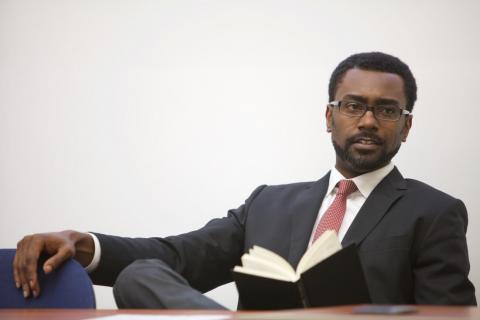On The State of the State Per Trump

The Trump election should surprise no one paying attention to either the economy or the culture. Both are in shambles. Trump is a “plug in” for a larger problem, a fall-guy really, for the re-establishment of American (economic) supremacy. Trump is an insidious threat to democracy, and even in ways that we cannot anticipate. While America will never have an official dictatorial office, Trump clearly embodies many of Hitler’s values and could easily tighten the bureaucratic controls in America in ways akin to 1933 Germany...
Trump’s nationalism is an insidious threat. But more dangerous is the uninterrogated patriotism that entrances us all. Many of us love America to the risk of all else; an America that long ago lost its state agenda to that of the global market. If Trump is a fascist threat to American democracy, Hilary Clinton represented America’s inability to confront these deeper cultural issues effectively. Surely, Clinton’s election would have signaled a threshold moment in its own right; the Democratic Presidential Nominee exploded gender paradigms in ways that Obama did for race. Yet the progressive balms of “diversity” and “multiculturalism” have worn thin on the deepening wounds of racism in the nation.
But even before Trump, the signs were there, most of all the American concern with security. Even under Obama (who I love) the American Dream remained the American nightmare for so many black and poor. And in a post-9/11, post-Patriot Act, post-Freedom Act world, the American nightmare had already spread to other groups: Muslims and other Arabs as well as Sikhs and other Indians have been suffering increasing persecution. In America, cultural and social traditions rooted in various forms of oppression - including racism, sexism, classism, and heteronormativity – continue to work to uphold the sinister social norm of whiteness, which combines a Romanticization of white skin with a lonely life of competition and self-interest. And yes, whiteness forces even white people to relenquish some of their richer cultural traditions, and to forsake the real love they often have for darker peoples.
Historically, Americans have never really been able to disentangle their more inclusive vision of civic nationalism from a vicious racial nationalism spurred by the glorification and normalization of whiteness. Instead, most have lived day to day with a cognitive dissonance about it all. Certainly, our often-neglected veterans are honorable, but as Ta-Nehisi Coates has noted in his “Case for Reparations,” “to proudly claim the veteran and disown the slaveholder is patriotism a la carte.” Despite good intentions, to “make America great again” will always mean to make it white again if the agenda is driven by nationalism.
Currently, even apart from Trump, there is a nationalist takeover of the state in process, and this means that the very meaning of the term ‘law’ is changing before our eyes. The government no longer acts according to constitutional law and habeas corpus, but the sovereign law of the nation, in this case, racism as economic science (neoclassical/neoliberalism). This kind of racism is more institutional than personal. The nationalist hold on state mechanisms is exploding the distinction between lawful and lawless governments. Now “arbitrary” market power (i.e. “development”) is the legitimate power, not the constitution. We see this arbitrariness not only in (urban) development policy, but also in the modern day “lynch law” exercised by so many police and everyday citizens against blacks, latinos and the poor. Such violence is in accord with the law of national preservation.
Those who call for justice nowadays call in vain. Michelle Alexander has documented well how police now have greater power than magistrates, that is, how justice has been displaced by raw power. Law has deteriorated into brute force for us. The fourth amendment (against unreasonable search and seizure), as well as the fourteenth (equal protection and rights for former slaves), and fifteenth (protecting racialized persons’ right to vote) have been eviscerated. Alexander has all but said it: we are witnessing the birth of a nation, and this means the death of the nation’s enemies. We who are dark and/or poor have been abandoned by the law and delivered over to sovereign violence.
God is God of the oppressed and the homeless, and laments the violence committed against them. As the gospel shows us, God makes herself like them, taking on their pain and suffering. And God is also deliverer of the oppressed; where the Spirit of the Lord is there is liberty. This theological claim is not an not an abstract principle, but a reality created in the struggle with the orphan, the widow, and the poor. Prophets should not be surprised if they are suddenly feeling a strong tug...God is calling us to let go of our fixation with security and to take more risks for the sake of her world.
Because God loves people, God has also called us to the tasks of home-building and inviting everyone in for homecoming. Following Jay Emerson Johnson, by “home” I do not mean all the places that make us comfortable and cozy, those familiar habitations of safe haven, important and vital as they are. Rather I mean ‘home’ as a space of freedom; freedom to be oneself, freedom to pursue the path to which one is called, and to live a full life of meaning and purpose, regardless of how far one queers from the norm. Beyond the politics of the moment (which are so very critical), and under the roof of God the Householder, we must answer the larger question of whether or not everyone in this world deserves such a home, or simply the few selected by you. The choice now is ours.